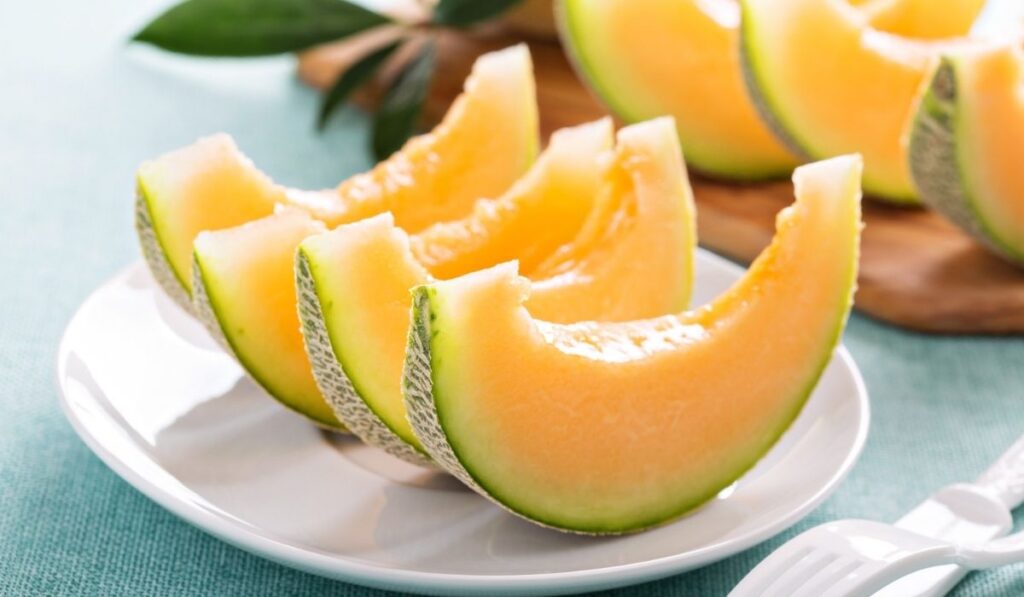Summer fruit is an excellent way to celebrate the season and get some nutrients. One of the most popular seasonal fruits is cantaloupes, sometimes called rockmelons. But if you’ve never had this melon before, you might not know when it’s in season or how to tell if it’s ripe.
Cantaloupes are in season from June to August. Depending on the location or climate, they can be available as early as April or May and can last until November. Cantaloupes are ripe when they have a tan exterior with light green lines, and they should have a fresh melon smell around the stem area.
Cantaloupes are a unique sweet treat that is chock full of nutrients and health benefits. We have you covered If you’ve never had one or aren’t sure how to tell if they’re ripe. Here’s what you need to know about cantaloupe season, when they’re ripe, and the associated health benefits.
What are Cantaloupes?

Cantaloupes, rockmelons, sweet melons, or spanspeks are all the same type of melon belonging to the muskmelon species.
This melon has either a hard “netted” outer skin or a heavy grooved suture-like exterior. Cantaloupes have a juicy, orange interior with a mildly sweet flavor. They’re typically eaten as sweet Summer treats or added to fruit salads.
Is Cantaloupe a Seasonal Fruit?
Yes, cantaloupes are seasonal fruit. Depending on the location and climate, cantaloupe is in season from June through August. In some areas, cantaloupes are available as early as April or May and can last till October or November.
When cantaloupe isn’t in season, you can find dried fruit options like this one (on Amazon) which can help you get your fix and tap into the nutritional value of these fruits (more on that below). Freeze-dried options like the Crispy Green Freeze-Dried Cantaloupe (also on Amazon) make a great nutritional snack any time of the year.
Are Cantaloupes Good For You?
Cantaloupes are an excellent sweet treat chock full of health benefits. They are mostly water, so they’re low in calories and don’t contain any fat or cholesterol.
This fruit is also nutrient and mineral-dense. Some of the nutrients you can find in cantaloupes include:
- Vitamin A
- Potassium
- Folate
- Vitamin K
- Vitamin B3
- Calcium
- Magnesium
- Manganese
- Phosphorous
- Copper
- Selenium
- Zinc
Here are some more health benefits of this sweet melon.
Full of Antioxidants
One cup of cantaloupe provides you with 100% of your daily value of Vitamin C, which is a powerful antioxidant that helps protect your cells from damage. In addition, antioxidants found in cantaloupe might help ward off inflammation in the body.
As a result, cantaloupes might reduce oxidative stress and cell damage, reducing the risk of severe health complications like diabetes, heart disease, arthritis, and more.
Improve Skin Health
One cup of cantaloupe also contains 100% of your daily recommended intake of Vitamin A and Vitamin C. Vitamin A and C play a crucial role in maintaining healthy skin.
Vitamin A helps protect your skin from sun damage. Vitamin C works to support your natural collagen production, which might slow the process of aging skin.
Protect Eye Health
Cantaloupe contains two antioxidants known as lutein and zeaxanthin. These compounds provide fruits and vegetables with their yellow and red hues. In addition, these antioxidants and Vitamin A play an essential part in protecting your vision and eyes.
Improve Immune System
On top of lutein and zeaxanthin, cantaloupes also contain beta-carotene. Beta-carotene is another compound responsible for the color of fruits and vegetables.
When ingested, beta-carotene can be transformed into vitamin A or acts as a robust antioxidant to help ward off free radicals in the body. These compounds are important for a healthy immune system, red blood cell function, and eye health.
Prevent Heart Disease
Cantaloupes contain fiber, potassium, and vitamin C. These nutrients are crucial for a healthy heart. Potassium can help to decrease blood pressure, which is a definite concern for heart disease. Fiber helps lower levels of “bad cholesterol,” which has been linked to lower risks of heart disease, stroke, and artery disease.
Reduce Risk of Cancer
The antioxidants found in cantaloupe can fight inflammation and reduce oxidative stress, which can help reduce the risk of certain cancers. In addition, the fiber found in the melon might also help lower the chances of developing colorectal cancer.
How to Choose a Ripe Cantaloupe

It’s essential to choose a good melon because cantaloupe is only available a few months out of the year.
To find a ripe cantaloupe, start by looking for tan exteriors with light green lines across them. Skip out on melons with brown or soft spots. The cantaloupe should be a bit firm but not too soft or dense.
To determine its ripeness, you can smell the cantaloupe at the stem core (where it was cut). It should give off a fragrant cantaloupe smell. Melons without a scent are under-ripe, and unpleasant odors are past their prime.
If you’re planning to wait a few days before cutting into the fruit, consider purchasing a slightly less ripe melon.
